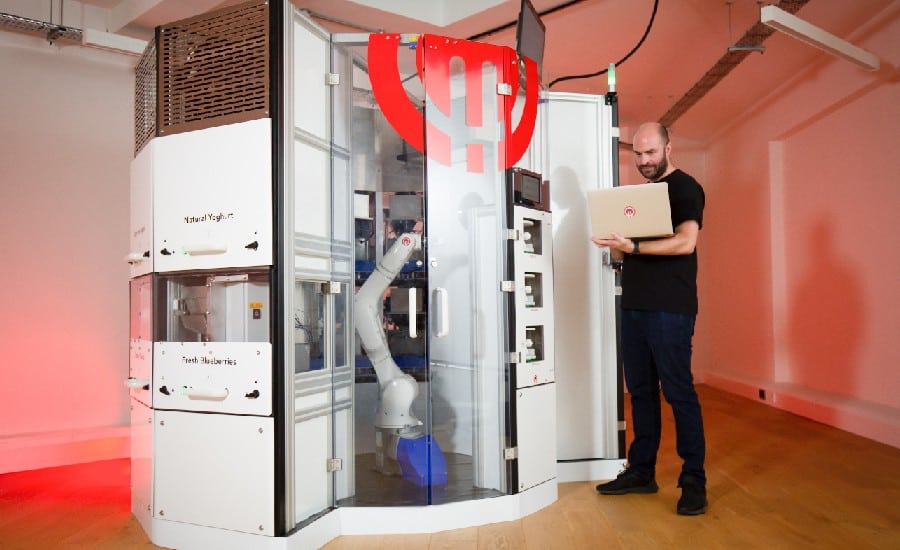From picking to plate, the food industry is heavily reliant on human labour and has relatively little automation. In a move to revolutionise the food and hospitality industry, London-based startup Karakuri has ambitious goals to bring robots and AI to the food industry finally.
They’re making it possible with their prototype dubbed as DK One — the first automated canteen run by a robotic arm for making meals. Interesting, isn’t it?
The UK robotic startup recently also announced £6.3 million investments, led by firstminute capital, and supported by Hoxton Ventures, Taylor Brothers, Ocado Group and the UK’s government-backed Future Fund.
Restaurant’s tight margins
Barney Wragg, Karakuri’s founder and CEO started seeing the potential for robotics in food preparation while helping friends in the restaurant industry. After a career, including working at microchip manufacturer ARM and the Really Useful Group Wragg was considering his next steps when he started thinking about restaurants’ tight profit margins.
“I was really surprised how tight those margins are,” Wragg told UKTN, “it doesn’t take much to really erode your margin. So well-run restaurants have traditionally relied on these super-humans with years of experience who can make those margins work.” Although the software has been employed to improve efficiency — who hasn’t had orders taken on an iPad? — restaurants still have several points where margins can quickly disappear, from the front of the house taking an order incorrectly to the kitchen using a little too much of a premium ingredient. Karakuri seeks to solve this problem.
The challenges in food preparation
The reason that robots have largely been left out of the food industry is the immense difficulty working with food presents. The shapes, sizes, textures and varieties mean that robots have difficulties even recognising the ingredients before it even considers preparation. Whether it’s the texture of the food being prepared, a cheeky taste from a bowl, hints from changing colours and aromas, or even the sizzle from the pan cooking is an incredibly sensual process for humans. So, how can a robot compete?
Karakuri’s DK-One is being developed to start using some of those senses. Its range of sensors can analyse the food it is using to prepare it in exactly the right way. It also can be precise in a way that no human can, offering exact portions of foods and mixes to cater for dietary and nutritional requirements.
Karakuri’s target markets
The most obvious application, and the areas Karakuri are exploring, are high-demand areas where there is pressure for food to be quick, but also higher quality than offered by established fast-food brands. Interest has been expressed by operators in high-footfall locations like airports and train stations, as well as contractors running high-demand operations like corporate canteens or university cafeterias. Supermarkets have also been keen to explore DK-One. “They want to modify and update their deli counter offerings, making it more hygienic, offer customers more choice and provide a smoother operation in store” Wragg explains.
The ups and downs of Covid
The Covid-19 pandemic has proven to be a mixed blessing for Karakuri. The pandemic’s impact hit the company’s plans, with scheduled demonstrations and tests being postponed. The first real-life use for DK-One was scheduled for 2021 when a unit was to be deployed at the Ocado headquarters offering employees a healthy breakfast and brunch (Ocado have a stake in Karakuri). However, with many staff members still working from home this has been postponed. Even the demonstration unit at Karakuri’s Hammersmith headquarters has been unable to receive its usual parade of visitors. Karakuri has faced additional difficulties in creating and testing the software and hardware when staff were largely working from home.
However, the pandemic has stimulated interest in the product. The increased demand for no-contact customer service, alongside the need to decrease the number of people working in the same area, means the DK-One can address infection control challenges as well as help with food production.
“Our vision is big and exciting. What we want to do as transformation would be, as big as Tesla is trying to do in terms of personal transport,” points Wragg. Further, he explains the transformation in interest during 2020, “At the beginning of 2020, major companies were interested but thinking it was something for five- or six-years’ time.” However, as the effects of the pandemic become apparent, these timescales shrank, “in the second half of 2020 we saw massively increased interest and commitment from major catering companies, big grocery groups and major restaurant groups.”


Nation, then global, expansion plans
Karakuri is a very early entrant to a nascent market and hopes to take advantage of that. The company plans to continue expanding its operation over 2021, actively recruiting people to join their — currently — 31-strong team.
The focus is currently on the UK and Europe, where there are ongoing conversations with strategic partners. Further expansion as the market develops and Karakuri can take the DK-One to international markets, where Wragg already sees interest, “we have customers all over the world who are just waiting for us to open our offices in the US and Australasia.
The post Karakuri, the British Tesla of kitchen and food robotics is here appeared first on UKTN (UK Tech News).


